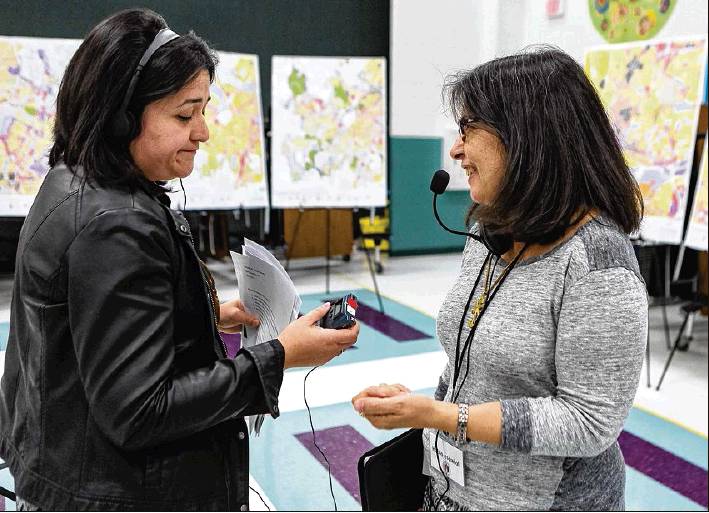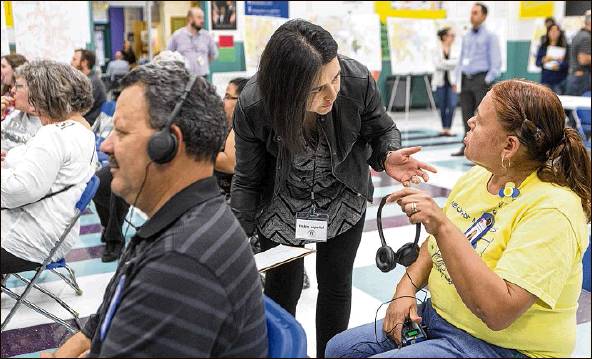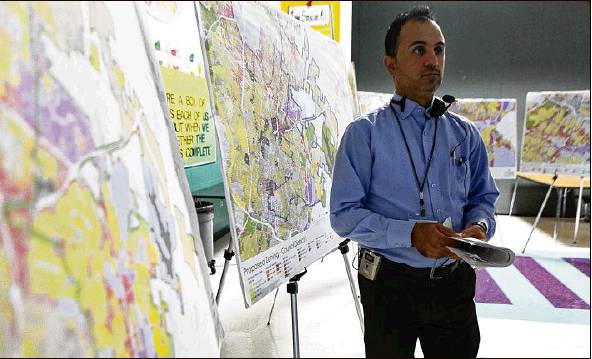STATESMAN IN-DEPTH AUSTIN DEVELOPMENT RULES
Non-English speakers in dark on CodeNext?
Austin tries to get word out to all, but some say its efforts are lacking.
By Philip Jankowski pjankowski@statesman.com
Inside the auditorium of Hart Elementary School in Northeast Austin on Wednesday, Abbas Arkawazi was diligently interpreting a city of Austin Planning and Zoning staffer’s presentation in real time into Arabic.
As CodeNext project manager Jorge Rousselin went through how the proposed codes have changed in CodeNext’s most recent draft —the transition to a more unified code name scheme — Arkawazi, a freelance interpreter who has worked for the city multiple times, spoke into a headset mic, his translation available to anyone needing it.
But no one was listening.
Wednesday’s event was one of the few outreach events the city has conducted with translations available for non-English speakers since CodeNext was unveiled in January, and the second since the city released its second draft of the code in September to offer any foreign language outreach. And while city staffers have increased the amount of non-English outreach in recent months, many believe the city has fallen flat in its efforts to reach the 14 percent of Austin residents — 115,000 people — who do not consider themselves proficient English speakers.
It’s not a new problem. A 2016 audit of language access in Austin found that the city has widely failed to meet the needs of residents who are not English speakers. But as the pace of CodeNext has quickened in recent months, critics of the city’s attempt to rewrite the entire land use code are finding the lack of outreach to minority and non-English speaking communities more urgent than ever.
“Communities of color especially have been left out of this process and don’t know what is about to hit them,” Susana Almanza, director of environmental and social justice nonprofit People Organized in Defense of Earth and her Resources, said during Thursday’s City Council meeting. “We are having to do a lot of that work and education without any resources from this council. That in itself is wrong; that is inequitable.”
At Wednesday’s Planning and Zoning meeting, two senior city staffers explained the code while interpreters there to translate to Chinese, Vietnamese and Arabic remained largely silent because no one was there to listen. Two women translating the presentations to Spanish were active but were speaking to the only two people in the council district with the largest immigrant population in the city who had come to the town hall meeting. At a CodeNext town hall Oct. 2 in East Austin that offered Spanish interpreters, no one requested their services.
And Arkawazi only translated the little that he did into Arabic at the request of a radio reporter looking for audio for a story on the event.
To be sure, CodeNext staffers have recently increased efforts to reach non-English speaking communities. They have translated a one-page overview of the massive rewrite of the city’s land use code into multiple languages. And after receiving some criticism about a lack of Spanish-language materials available, they increased the number of town hall meetings with Spanish interpreters from one to three.
“We heard from the community that increasing the number of meetings with interpretation services would be helpful, but also that the geographic diversity of meetings, children’s activities, and holding the meetings at different times would help with attendance and engagement,” Rousselin said in emailed comments to the Statesman. “In response to the feedback we’ve heard, we have spread the meetings with Spanish interpretation across Austin, provided child care services and light refreshments, and are holding events on three different days at different times.”
CodeNext is the city’s attempt to implement the recommendations of the 2012 Imagine Austin comprehensive plan by revising what type of development can go where. The effort aims to address many of Austin’s most vexing problems, including a lack of low-income housing, gentri›ication and traffic congestion, by rewriting the entire land use code and zoning map.
The city staff released the second draft of the code and maps in September, and consultants and city staffers will begin creating a third draft next month. The City Council is scheduled to approve CodeNext in April. Only one more town hall event with Spanish interpreters is scheduled before its slated approval.
“Our current outreach efforts have problems,” City Council Member Greg Casar told the Statesman. “I don’t think it is within the existing city structure’s wheelhouse, and not just on this issue, but issues generally.”
In City Council districts such as Casar’s in North and Northeast Austin, CodeNext so far has proposed fewer changes than in Austin’s central core. The changes to his district — where the audit said more than one-fourth of residents don’t speak English very well — fall along commercial corridors that would allow new residential development. A smaller portion reaches into the central city, where wider changes have been proposed.
CodeNext’s draft map showed far more geocoded comments being submitted on properties in and around downtown, where CodeNext aims to encourage density. Very few comments were submitted from Southwest Austin, which has the greatest concentration of Spanish-speaking residents.
“My district has been left out of these processes for a long time, and it has been a struggle to get them involved,” said Council Member Delia Garza, who represents the sprawling Southwest Austin district.
And not a single comment was submitted in Spanish.
“The Latino population is not weighing in because the Spanish outreach has been abysmal,” said Mary Ingle, president of the Austin Neighborhoods Council. “Where are the Spanish materials, the Spanish handouts? There has been no targeted outreach.”
The city has created a Spanish-language website for CodeNext, but it has fewer links to materials than the English-language home page. Rousselin said staffers are working on translating an 11-page CodeNext preview into Spanish. Spanish-language services are offered in one-on-one sessions with staffer for people with questions about CodeNext.
“We are continuing to seek feedback both on the engagement process with multicultural communities and on the code text and zoning map itself,” Rousselin said. “Hearing from the entire Austin community is important to us; it ensures that we are writing a code that is better for everyone.”
Contact Philip Jankowski at 512-445-3702.


